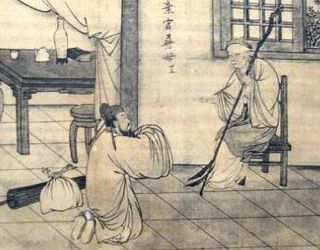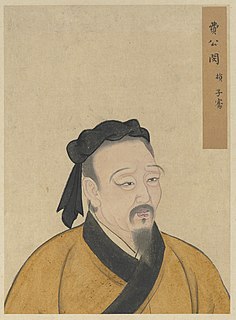 W
WThe Twenty-four Filial Exemplars, also translated as The Twenty-four Paragons of Filial Piety, is a classic text of Confucian filial piety written by Guo Jujing (郭居敬) during the Yuan dynasty (1260–1368). The text was extremely influential in the medieval Far East and was used to teach Confucian moral values.
 W
WHuang Tingjian was a Chinese calligrapher, painter, and poet of the Song dynasty. He is predominantly known as a calligrapher, and is also admired for his painting and poetry. He was one of the Four Masters of the Song Dynasty, and was a younger friend of Su Shi and influenced by his and his friends' practice of literati painting, calligraphy, and poetry.
 W
WLu Ji (188–219), courtesy name Gongji, was a Chinese politician and scholar serving under the warlord Sun Quan in the late Eastern Han dynasty of China. He was also one of the 24 Filial Exemplars.
 W
WMin Sun, also known by his courtesy name Ziqian, was one of the most prominent disciples of Confucius. Confucius considered Min his second best disciple after Yan Hui, and commended him for his filial piety. His legend is included in the Confucian text The Twenty-four Filial Exemplars.
 W
WEmperor Shun was a legendary leader of ancient China, regarded by some sources as one of the Three Sovereigns and Five Emperors being the last of the Five Emperors. Tradition holds that he lived sometime between 2294 and 2184 BC. Tradition also holds that those with surname Chen (陳) are descendants of Emperor Shun. The Duke Hu of Chen, a descendant of Shun, became the founder of the State of Chen. Later Chen dynasty emperors such as Chen Baxian would also claim descent from Shun.
 W
WThe Tomb of Min Ziqian is a memorial to Min Sun, a disciple of Confucius and the fourth of the 24 Confucian paragons of filial piety. The memorial is located in Jinan, the capital of Shandong Province, China.
 W
WWang Xiang (185–269), courtesy name Xiuzheng, was a Chinese politician who lived through the late Eastern Han dynasty (25–220), the Three Kingdoms period (220–280), and the early Western Jin dynasty (265–316) of China. He served among the highest positions in the government, including Minister of Works (司空) and Grand Commandant (太尉) in the Cao Wei state during the Three Kingdoms period, and Grand Protector (太保) during the Western Jin dynasty. He was also one of The Twenty-four Filial Exemplars.
 W
WEmperor Wen of Han was the fifth emperor of the Han dynasty of ancient China. His personal name was Liu Heng (劉恆).
 W
WZeng Shen, better known as Zengzi, courtesy name Ziyu, was a Chinese philosopher and disciple of Confucius. He later taught Zisi, the grandson of Confucius, who was in turn the teacher of Mencius, thus beginning a line of transmitters of orthodox Confucian traditions. He is revered as one of the Four Sages of Confucianism.
 W
WZhong You, commonly known by his courtesy names Zilu and Jilu, was one of the best known and most faithful disciples of Confucius. Among Confucius's disciples, he was the second in terms of ability and accomplishment in statesmanship, after Ran Qiu. He was noted for his valour and sense of justice, but Confucius often warned him against acting without forethought. He was killed in the State of Wey in defence of his lord Kong Kui.